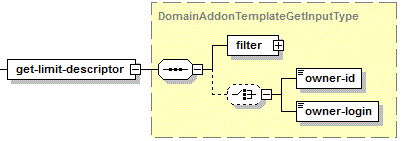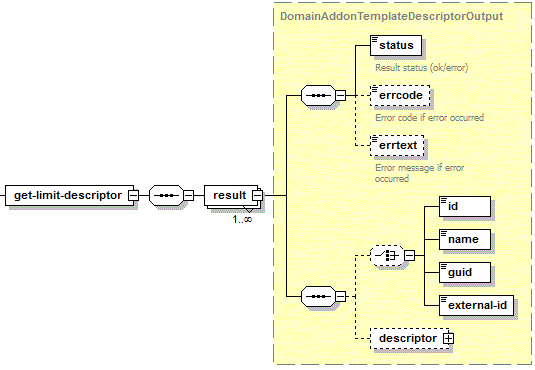Retrieving Descriptor of Limits
Use the get-limit-descriptor operation to retrieve limits descriptor of add-on plans. For details on the limits descriptors, refer to the Representation of Object Descriptors section. For details on limits of service plans, refer to the Limits section.
Request Packet Structure
A request XML packet retrieving add-on plan limits includes the get-limit-descriptor operation node:
<packet>
<service-plan-addon>
<get-limit-descriptor>
...
</get-limit-descriptor>
</service-plan-addon>
</packet>
The get-limit-descriptor node is presented by type
DomainAddonTemplateGetInputType (domain_addon_template.xsd). Its
graphical representation is as follows:

Note: The interactive schema navigator for all request packets is available here: http://plesk.github.io/api-schemas/1.6.9.1/agent_input.svg.
Note: When creating request packets, put nodes and elements in the order they follow in the packet structure.
Response Packet Structure
The get-limit-descriptor node of the output XML packet is of type
DomainAddonTemplateDescriptorOutput (domain_addon_template.xsd)
which is structured as follows:

Note: The interactive schema navigator for all response packets is available here: http://plesk.github.io/api-schemas/1.6.9.1/agent_output.svg.
-
The result node is required. It wraps the result of the requested get-limit-descriptor operation. Data type: ResultFilterType (
common.xsd). -
The status node is required. It returns the execution status of the get-limit-descriptor operation. Data type: result_status (
common.xsd). Allowed values:ok|error. -
The errcode node is optional. Is used to return the error code when the get-limit-descriptor operation fails. Data type: unsignedInt.
-
The errtext node is optional. Can be used to return an error message if the get-limit-descriptor operation fails. Data type: string.
-
The id node is optional. It is required if the operation succeeds and the results are filtered by ID. It returns an ID of the add-on plan which limits descriptor was displayed. Data type: id_type (
common.xsd). -
The name node is optional. It is required if the operation succeeds and the results are filtered by name. It returns a name of the add-on plan which limits descriptor was displayed. Data type: string (
common.xsd). -
The guid node is optional. It is required if the operation succeeds and the results are filtered by GUID. It returns a GUID of the add-on plan which limits descriptor was displayed. Data type: string (
common.xsd). -
The external-id node is optional. It is required if the operation succeeds and the results are filtered by external ID. It returns the external ID of the add-on plan which limits descriptor was displayed. Data type: string (
common.xsd). -
The descriptor node is required if the get-limit-descriptor operation succeeds. It specifies object descriptor. For details, refer to the Representation of Object Descriptors section. Data type: string.
Note: This descriptor contains limits extensions. For details, refer to the Representation of Object Descriptors: Property Descriptor > Extension of Limits Descriptor section.
Retrieving limits descriptor
The following packet retrieves limits descriptor for a service plan:
<packet>
<service-plan-addon>
<get-limit-descriptor>
<filter>
<name>base_plan</name>
</filter>
</get-limit-descriptor>
</service-plan-addon>
</packet>
Response:
<packet>
<service-plan-addon>
<get-limit-descriptor>
<result>
<status>ok</status>
<name>1 Additional Gigabyte</name>
<descriptor>
<property>
<name>max_site</name>
<type>int</type>
<writable-by>admin</writable-by>
<label>limit__max_site</label>
<extension>
<shared>false</shared>
</extension>
</property>
<property>
<name>max_subdom</name>
<type>int</type>
<writable-by>admin</writable-by>
<label>limit__max_subdom</label>
<extension>
<shared>false</shared>
</extension>
</property>
...
</descriptor>
</result>
</get-limit-descriptor>
</service-plan-addon>
</packet>
Note: Data structures that describe a number of properties are omitted to improve the readability of the sample.
A single filter can specify multiple plans, all specified either by ID or by name.
<packet>
<service-plan-addon>
<get-limit-descriptor>
<filter>
<name>base_plan</name>
<name>quick_plan</name>
</filter>
</get-limit-descriptor>
</service-plan-addon>
</packet>